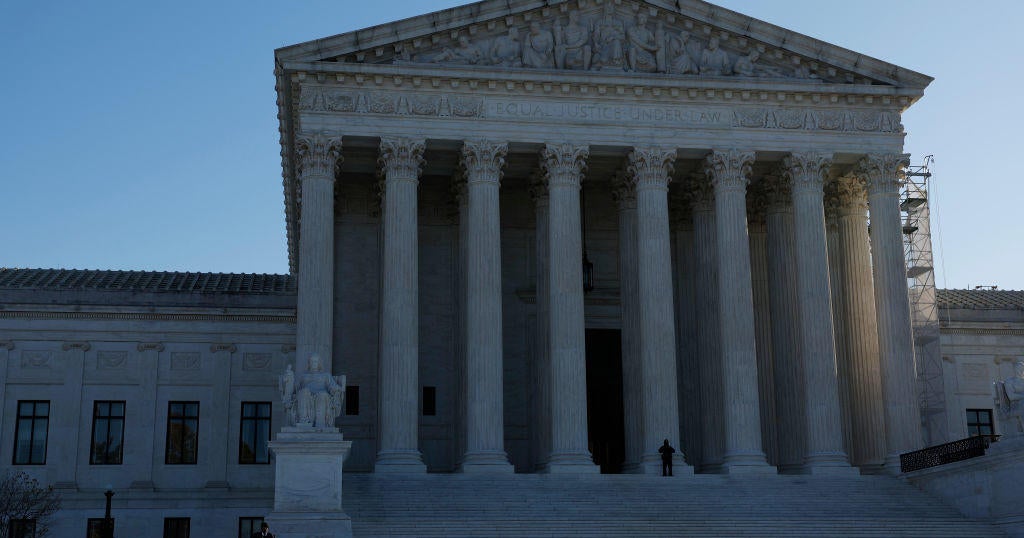CBS News
Considering credit card debt forgiveness this fall? Here are 5 signs to look for

Getty Images
While credit cards can be useful financial tools when managed responsibly, it’s surprisingly easy for this type of debt to become problematic. After all, the interest rates on credit cards tend to be higher than other borrowing options, so if you’re not paying off what you owe in full each month, your balance can grow out of control quickly. Couple that with the other economic hurdles we’re facing, like inflation pushing up the cost of housing, groceries and other necessities, and it’s easy to understand why credit card debt could feel like a heavy burden on your budget right now.
That doesn’t have to be the case, though. There are debt relief options, like credit card debt forgiveness (or debt settlement), that can help.
With debt forgiveness, the goal is to negotiate with your creditors to get them to accept less than the full amount owed to settle your debt. This option has its downsides, of course, but it can provide a lifeline for those drowning in credit card debt. So, if you’re overwhelmed by your credit card debt, it could benefit you to determine whether credit card debt forgiveness is the right step for you this fall.
Ready to start on the path to becoming debt-free? Explore your debt relief options here.
5 signs you should pursue credit card debt forgiveness this fall
If you recognize any of the following signs, it could make sense to consider debt forgiveness this fall:
Your credit cards are maxed out (or getting close to it)
Right now, a large (and growing) percentage of cardholders have maxed-out credit card accounts. About one in five credit card users are maxed out currently, according to data from the New York Fed. If you’re one of them, it’s probably a sign that you should consider credit card debt forgiveness.
When your credit cards are consistently at or near their limits, it’s a red flag that you’re relying too heavily on credit to cover your expenses. Being close to your credit limits also leaves you with little to no financial cushion for emergencies, and could force you to take on even more debt if unexpected expenses arise. By settling your debt, though, you could end up paying a fraction of what you currently owe, alleviating some of the financial pressure you’re facing.
Explore how the right debt forgiveness program could help you get your finances back on track.
Your credit card debt is compounding
Credit card interest rates are notoriously high. It’s common for credit cards to come with rates between 18% and 23%, but they can be much higher depending on your credit profile. In turn, any card debt you carry tends to compound quickly, making it increasingly difficult to pay off what you owe.
For example, let’s say you have a balance of $5,000 on a credit card with a 21% APR. If you were to make payments of $150 per month, it would take you over four years and $2,569.79 in interest charges to pay it off. That means you would pay the equivalent of more than 50% of the original balance in interest charges alone.
So, if you’ve noticed that your balances are increasing each month, it’s a clear sign that the interest you’re paying could become problematic in the future. That, in turn, may require you to take more drastic measures to get rid of your debt.
You’re only able to afford the minimum
While making only the minimum payment on your credit cards will keep your accounts current, it does little to reduce your overall debt. By only paying the minimum, you’re extending the life of your debt and significantly increasing the total amount you’ll pay over time.
So, if you find yourself unable to pay more than the minimum across multiple cards for several months in a row, it’s a strong indicator that your debt has become unmanageable. In turn, debt forgiveness might be worth considering.
You’re making late payments (or are missing payments entirely)
Late or missed payments are serious issues in terms of your financial health. Not only do they result in late fees and potential penalty interest rates, but they also severely damage your credit score.
If you’re struggling to make payments on time or have missed payments altogether, it’s a clear sign that your current debt load is unsustainable. At this point, exploring your debt forgiveness options may help you avoid further damage to your credit and get your finances back on track.
You’re seriously considering bankruptcy
Filing for bankruptcy should generally be considered a last resort due to its long-lasting impact on your credit and financial life. If you’ve reached the point where you’re seriously contemplating bankruptcy, it’s important to first explore debt settlement as an alternative. While debt settlement will still have a negative impact on your credit, it’s typically less severe and shorter-lived than bankruptcy. It also allows you to avoid the legal proceedings and potential asset liquidation associated with bankruptcy.
The bottom line
As we move into the fall season, take this opportunity to honestly assess your financial situation. If you identify with one or more of these signs, it may be time to reach out to a debt relief company to discuss whether debt forgiveness or another debt relief option could help. Remember, though, that while debt settlement can provide relief from overwhelming credit card debt, it’s crucial to also address the underlying financial habits that led to the debt in the first place.
CBS News
What to know about the charges in UnitedHealthcare CEO’s killing

Watch CBS News
Be the first to know
Get browser notifications for breaking news, live events, and exclusive reporting.
CBS News
Prominent pro-Putin ballet star Sergei Polunin says he’s leaving Russia

Moscow — Former Royal Ballet star Sergei Polunin, famous for his tattoos of Russian President Vladimir Putin, on Wednesday announced that he plans to leave Russia. The Ukrainian-Russian dancer was one of the most prominent stars who backed Russia’s unilateral 2014 annexation of Crimea and its military assault on Ukraine. He was rewarded with prestigious state posts.
In a rambling, misspelled message on his Instagram account, Polunin wrote: “My time in Russia ran out a long time ago, it seems at this moment that I have fulfilled my mission here.”
The post first appeared Sunday on his little-read Telegram account.
Ian Gavan/Getty
Polunin, 35, did not give a specific reason for leaving but said that “a time comes when the soul feels it is not where it should be.”
He said he was leaving with his family — his wife Yelena and three children — but “where we will go is not clear so far.”
In the summer, the dancer complained of a lack of security and said he was being followed.
Polunin, who was born in Ukraine, backed Putin’s 2014 annexation of Crimea — a prelude to the ongoing, full-scale invasion of Ukraine that Putin launched in February 2022.
The dancer was granted Russian citizenship in 2019. He was appointed acting head of a dance academy in occupied Crimea’s biggest city, Sevastopol, and director of the city’s opera and ballet theatre, for which a large new building is under construction.
Just last year he was decorated by Putin for his role in popularizing dance. But in August he was replaced as head of the dance academy by former Bolshoi prima Maria Alexandrova, and a week ago, Russia’s arts minister Olga Lyubimova announced his theater director job would go to singer Ildar Abdrazakov.
This came after on December 9 Polunin published a social media post saying he was “very sorry for people” living in the heavily bombarded village near Ukraine’s city of Kherson, where his family originates from, and that “the worst deal would be better than war.”
Ian Gavan/Getty
Aged 13, Polunin won a scholarship to train at the Royal Ballet School in London and became its youngest ever principal dancer.
With his tattoos — including a large depiction of Putin’s face emblazoned prominently on his chest — and his rebellious attitude, he became known as the “bad boy of ballet” and caused a sensation by resigning from the Royal Ballet at the height of his fame in 2012.
Later he made a 2015 hit video to Irish musician Hozier’s song “Take Me to Church” and was the star of a 2016 documentary called “Dancer.”
He moved to perform at Moscow’s Stanislavsky Musical Theatre’s ballet before launching a solo career, starring in dance performances in roles including the mystic Grigory Rasputin.
In 2019 he posed for AFP with a large tattoo of Putin on his chest which he later supplemented with two Putin faces on either shoulder. He also has a large Ukrainian trident on his right hand.
This year he took part in Putin’s campaign for reelection as a celebrity backer.
CBS News
Supreme Court takes up South Carolina’s effort to defund Planned Parenthood

Washington — The Supreme Court on Wednesday agreed to consider South Carolina health department’s effort to cut off funding from Planned Parenthood because it performs abortions, wading into another dispute over access to the procedure in the wake of its reversal of Roe v. Wade.
The case, known as Kerr v. Edwards, stems from the state’s decision in 2018 to end Planned Parenthood South Atlantic’s participation in its Medicaid program. Gov. Henry McMaster, a Republican, directed the South Carolina Department of Health and Human Services to deem abortion clinics unqualified to provide family planning services and end their Medicaid agreements.
Planned Parenthood operates two facilities in the state, one in Charleston and the other in Columbia, and provides hundreds of Medicaid patients with services like physicals, cancer and other health screenings, pregnancy testing and contraception. Federal law prohibits Medicaid from paying for abortions except in cases of rape or incest, or to save the life of the mother.
Planned Parenthood and one of its patients, Julie Edwards, sued the state, arguing that cutting off its funding violated a provision of the Medicaid Act that gives beneficiaries the right to choose their provider.
A federal district court blocked South Carolina from ending Planned Parenthood’s participation in its Medicaid program, and a U.S. appeals court upheld that decision, finding that Edwards could sue the state to enforce the Medicaid Act’s free-choice-of-provider requirement.
The legal battle has already been before the Supreme Court in the past, with the high court last year ordering additional proceedings after deciding in a separate case that nursing home residents could sue their state-owned health care facility over alleged violations of civil rights.
After reconsidering its earlier decision, the three-judge appeals court panel ruled unanimously in March that Edwards’ lawsuit against the state could go forward and said South Carolina couldn’t strip Planned Parenthood of state Medicaid funds.
“This case is, and always has been, about whether Congress conferred an individually enforceable right for Medicaid beneficiaries to freely choose their healthcare provider. Preserving access to Planned Parenthood and other providers means preserving an affordable choice and quality care for an untold number of mothers and infants in South Carolina,” Judge Harvie Wilkinson wrote for the 4th Circuit panel.
South Carolina officials asked the Supreme Court to review that decision, marking the third time the case has been before the justices. The justices agreed to take up the question of whether “the Medicaid Act’s any-qualified provider provision unambiguously confers a private right upon a Medicaid beneficiary to choose a specific provider.”
South Carolina is among the more than two dozen that have passed laws restricting access to abortion in the wake of the Supreme Court’s June 2022 decision reversing Roe v. Wade. In South Carolina, abortion is outlawed after six weeks of pregnancy with some exceptions.
Several states have also enacted laws blocking Planned Parenthood from receiving Medicaid funding, including Arkansas, Missouri, Mississippi and Texas.




